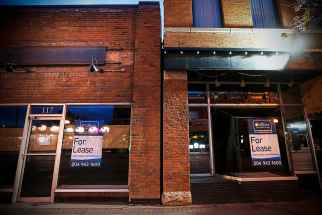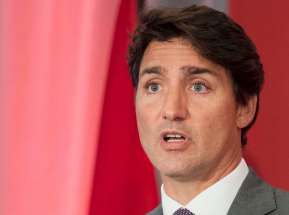Economic forecast no cause for panic, but can’t be ignored by incoming government, say business leaders
Read this article for free:
or
Already have an account? Log in here »
To continue reading, please subscribe:
Monthly Digital Subscription
$0 for the first 4 weeks*
- Enjoy unlimited reading on winnipegfreepress.com
- Read the E-Edition, our digital replica newspaper
- Access News Break, our award-winning app
- Play interactive puzzles
*No charge for 4 weeks then price increases to the regular rate of $19.00 plus GST every four weeks. Offer available to new and qualified returning subscribers only. Cancel any time.
Monthly Digital Subscription
$4.75/week*
- Enjoy unlimited reading on winnipegfreepress.com
- Read the E-Edition, our digital replica newspaper
- Access News Break, our award-winning app
- Play interactive puzzles
*Billed as $19 plus GST every four weeks. Cancel any time.
To continue reading, please subscribe:
Add Free Press access to your Brandon Sun subscription for only an additional
$1 for the first 4 weeks*
*Your next subscription payment will increase by $1.00 and you will be charged $16.99 plus GST for four weeks. After four weeks, your payment will increase to $23.99 plus GST every four weeks.
Read unlimited articles for free today:
or
Already have an account? Log in here »
Hey there, time traveller!
This article was published 23/08/2019 (2301 days ago), so information in it may no longer be current.
On the road to a likely election victory, there’s a potential economic hurdle that Progressive Conservative Leader Brian Pallister will have to overcome.
For a premier who has made the bottom line his top priority, the financial forecast is not as strong as the Tories would have hoped just three weeks before Manitobans vote.
Has Pallister’s singular focus on austerity in his first term in office led to economic stagnancy in his second?
Business leaders say the pessimistic economic forecast for Manitoba delivered by the Conference Board of Canada this week is no cause for alarm, but it’s something whichever party wins power Sept. 10 needs to be mindful of.
The Ottawa think-tank forecasts the province’s economic growth rate this year at a mere 0.5 per cent and next year’s at 0.8 per cent. That’s well below projections for Canada of 1.4 per cent in 2019 and 1.8 per cent in 2020.
“We can talk about health care all we want… but if the economic growth is not there then, effectively, what we’re talking about is deficit financing going forward. And that’s definitely not something Manitobans want to see a return to.” – Winnipeg Chamber of Commerce president Loren Remillard
The Conference Board cited the completion or near completion of Manitoba Hydro’s Bipole III transmission line and Keeyask Generating Station, Chinese trade actions targeting agricultural exports and a slowdown in the province’s mining industry, among other factors, for its gloomy outlook.
Several commentators have noted that the board’s projections for Manitoba are much lower than that of Canada’s major banks, which peg the province’s economic growth rate at about 1.5 per cent for both this year and next.
“I wouldn’t panic with this one forecast. I’d wait and see if the banks start coming in over the next month with significantly reduced numbers. That would be a telltale sign,” said Don Leitch, president and CEO of the Business Council of Manitoba.
Leitch noted that such fundamentals as retail sales, tax revenues and private capital spending intentions continue to be positive in Manitoba.

However, the Liberals and the NDP pounced on the weak growth forecast this week, saying they show that the Pallister government’s austerity push is backfiring.
Liberal Leader Dougald Lamont accused the PCs of having no economic growth strategy and criticized them for failing to take full advantage of federal cost-shared programs. NDP Leader Wab Kinew claimed Pallister wanted to call an early election because he knew the province was headed for a recession.
Kevin Rebeck, president of the Manitoba Federation of Labour, said the Conference Board report shows that cuts to services and infrastructure spending are “stalling the economy.”
“They’re killing good, family supporting jobs in the process,” he said of the government.
At a campaign announcement Friday, Pallister shrugged off the forecast, saying the Conference Board has “consistently under-projected” the province’s economic performance over the past few years.
“I care about the outcomes, I care about the results,” he said, noting that Manitoba has outperformed other provinces in attracting private-sector investment while reducing red tape.

“We’re hitting the targets we’ve established,” the premier said. “Our goal has been to move our deficits down — and we have — to lower our taxes… and to make Manitobans more secure and confident in terms of their future.”
John McCallum, longtime economics professor at the University of Manitoba, said the PCs were correct to tackle the large operating deficit left to them by the previous NDP government and attempt to reorganize the delivery of services, such as health.
“I have no problem with what this government has done in attempting to dial the spending back,” he said.
With the deficit coming under control, the Tories, if re-elected, should adopt “a more balanced” approach of spending controls and strategic investments that will spur economic growth, McCallum said.
“You can put infrastructure (spending) off a little bit while you stabilize the financial situation, but there’s a point at which you have to invest more in (roads) and so on,” he said.
As its fiscal picture continues to improve, the government might also consider offering incentives to corporations to have them locate or expand their operations in Manitoba, McCallum said.
“The reality of 2019, (is) if you’re a company with 1,000 jobs to put somewhere, you’re looking for financial assistance,” he said.
Winnipeg Chamber of Commerce president Loren Remillard said while the Conference Board report may be overly pessimistic, it serves the useful purpose of validating his organization’s belief that the economy is the No. 1 issue of the election campaign.
“Economic growth provides the means to be able to deliver on the services that Manitobans have come to rely on,” he said. “We can talk about health care all we want… but if the economic growth is not there then, effectively, what we’re talking about is deficit financing going forward. And that’s definitely not something Manitobans want to see a return to.”
Another takeaway from the report, Remillard said, is that Manitoba’s economy should be driven by private-sector growth, not government spending.
“If you build your economy around public-sector jobs and public-sector investments, it’s not a solid foundation for long-term economic growth,” he said.
larry.kusch@freepress.mb.ca

Our newsroom depends on a growing audience of readers to power our journalism. If you are not a paid reader, please consider becoming a subscriber.
Our newsroom depends on its audience of readers to power our journalism. Thank you for your support.












